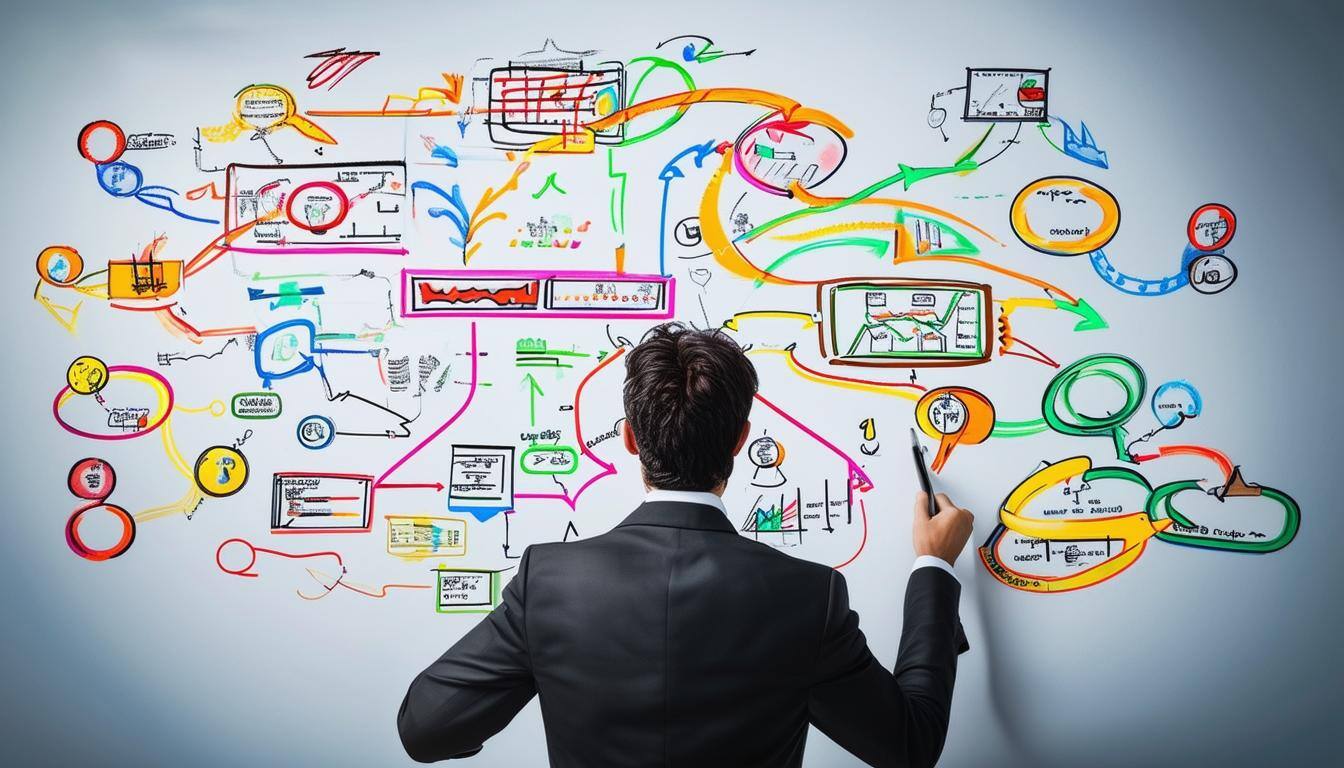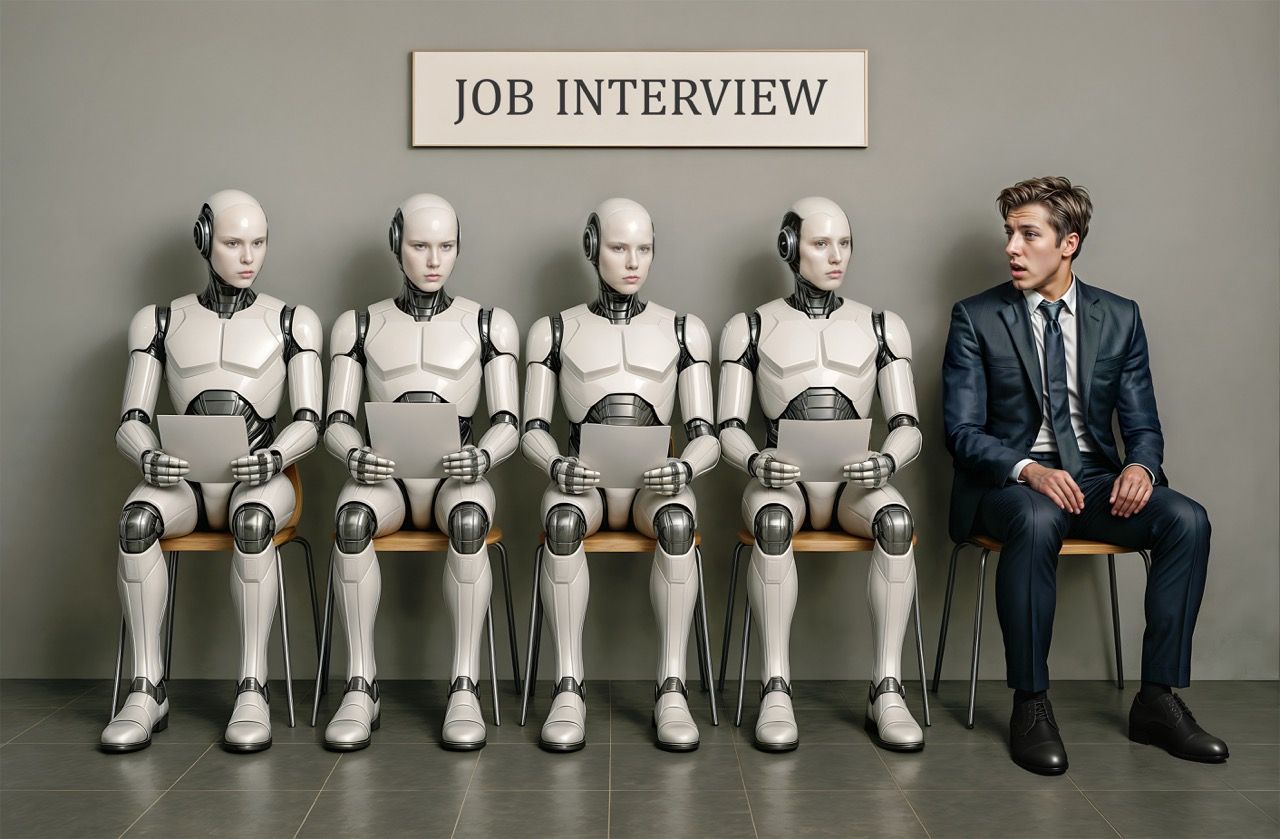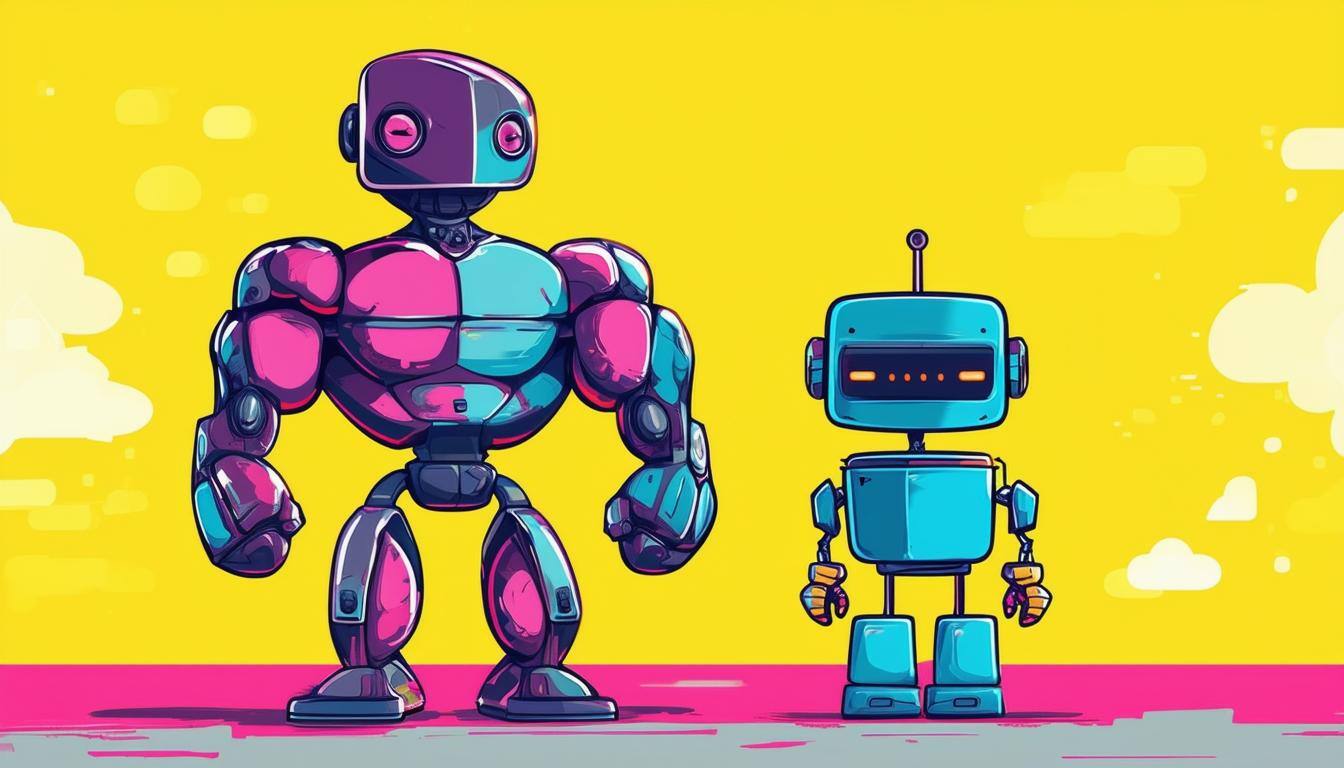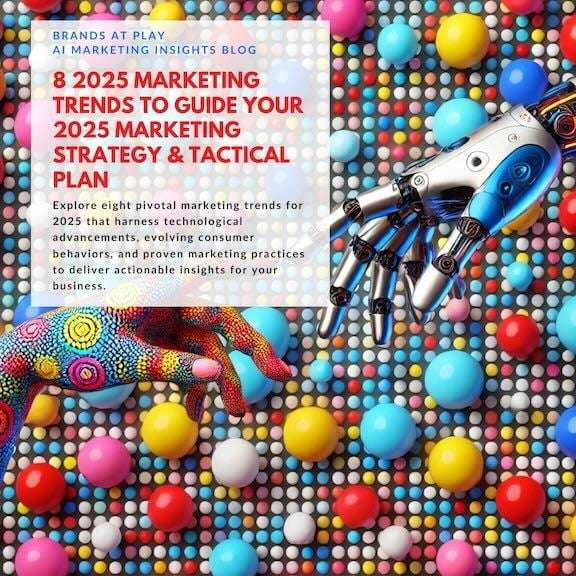9 min read
AI Creating New Marketing Jobs in the Age of Automation
Stephanie Unterweger : Sep 3, 2025 4:23:36 PM


While 75% of marketing professionals express concern about AI replacing their jobs, the reality tells a different story. Contrary to popular belief, AI is actually creating more marketing jobs than it's eliminating. The World Economic Forum projects that AI will create 97 million new jobs by 2025 while displacing 85 million roles—resulting in 12 million new positions.
This optimistic outlook is reshaping the marketing landscape, where automation and AI are not threats but invaluable tools. In this blog post, we’ll explore the current state of AI in marketing, the new roles emerging from this digital transformation, and the AI skills marketers need to thrive in this exciting era. For marketers, small business owners, and tech enthusiasts, it's essential to understand how AI is creating unprecedented opportunities.
The Current State of AI in Marketing
The integration of AI in marketing is no longer a futuristic vision—it's a present-day reality. Companies across the globe are leveraging AI to enhance marketing strategies and achieve remarkable results.
Adoption Statistics
A staggering 83% of businesses now consider AI a top priority in their business plans, as reported by PwC in 2023. This emphasis on AI is evident in the financial commitment made by companies. According to MarketsandMarkets, AI marketing spending is projected to reach $107.5 billion by 2028. These figures highlight the growing reliance on AI to drive marketing strategies forward.
83% of businesses now consider AI a top priority in their business plans
(PwC, 2023)

AI's impact on revenue generation is undeniable. Capgemini reveals that 76% of enterprises prioritizing AI have seen their revenue increase by 10% or more. Furthermore, McKinsey estimates a 40% average improvement in productivity for marketing teams leveraging AI, showcasing the technology's ability to streamline operations and boost efficiency.
Public Perception
Despite the fear of job displacement, AI is largely perceived as a catalyst for positive change. A Salesforce survey found that 61% of marketers fear job loss due to AI, yet 84% of marketing leaders believe AI will enhance, not replace, creative teams. The consensus is that AI can complement human creativity, allowing marketers to focus on more strategic and innovative tasks.
In the B2B sector, the interest in AI-driven personalization is overwhelming. Salesforce reports that 71% of B2B marketers are keen on using AI for personalization, recognizing its potential to deliver tailored experiences to customers. The ability to customize interactions at scale is one of AI's most significant advantages.
How AI Transforms Marketing Roles
AI is revolutionizing marketing jobs by introducing efficiency improvements and enabling new capabilities that were once unimaginable.
Efficiency Improvements
AI is a game-changer when it comes to efficiency. Deloitte reports a 40% reduction in time spent on repetitive tasks, allowing marketers to allocate their efforts to higher-value activities. Cost reduction is another key benefit, with Deloitte estimating a 37% average cost reduction through AI automation.
AI's impact on email marketing is particularly noteworthy. Accenture found that AI-driven email campaigns achieve 41% higher open rates, proving that AI can optimize content delivery for maximum engagement. Additionally, Gartner highlights a 58% improvement in targeting accuracy, ensuring that marketing messages reach the right audience at the right time.
New Capabilities in Marketing Created
AI opens doors to new possibilities in marketing. Predictive analytics, for instance, empowers marketers to anticipate customer behavior and preferences, enabling proactive decision-making. The era of hyper-personalization is here, thanks to AI's ability to deliver tailored experiences at scale.
Real-time customer journey optimization is another advantage of AI. Marketers can now track and respond to customer interactions as they happen, ensuring a seamless and engaging experience. Automated campaign management simplifies the execution of complex marketing strategies, while advanced customer segmentation allows for precise audience targeting.
Emerging AI Marketing Jobs
AI's influence on marketing is giving rise to a host of new AI careers in marketing that are reshaping the industry landscape.
New AI Marketing Roles
- AI Marketing Strategist
The AI Marketing Strategist plays a pivotal role in integrating AI into marketing strategies. With an average salary ranging from $125,000 to $175,000, this role is focused on developing AI implementation strategies that align with business objectives. AI Marketing Strategists are responsible for evaluating AI tools, overseeing content initiatives, and leveraging AI-generated insights to shape marketing plans.
- Marketing Automation Architect
Marketing Automation Architects are tasked with designing automated workflows that enhance marketing efficiency. Earning between $95,000 and $145,000, these professionals create systems that streamline campaign management and ensure seamless customer interactions. Their expertise lies in designing processes that maximize the benefits of automation.
- Marketing Data Scientist
Working in one of the most fascinating areas of Artificial Intelligence, Marketing Data Scientists specialize in predictive analytics by helping organizations harness the power of data to drive decision-making. With salaries ranging from $115,000 to $165,000, these experts analyze data to uncover trends, optimize campaigns, and inform strategic planning. Their role is crucial in transforming raw data into actionable insights.
- AI Content Optimization Specialist
AI Content Optimization Specialists focus on developing AI-powered content strategies and leveraging AI tools and technologies to improve the performance, relevance, and visibility of digital content. This role focuses on aligning content with target audience needs, business objectives, and search engine algorithms to maximize engagement, conversions, and ROI. With an average salary of $85,000 to $120,000, these professionals play a critical role in bridging technology and creativity, ensuring that digital content resonates with target audiences while meeting strategic business goals. Their work ensures that messaging not only aligns with customer needs and brand objectives but also stays competitive in an increasingly data-driven and personalized digital landscape.
AI, Technical, and Strategic Skills for Future Marketing Career Success
To succeed in the evolving landscape of AI-driven marketing, professionals must acquire a blend of technical and strategic skills.
Technical Skills Required
Proficiency in AI and marketing automation platforms is essential for marketers looking to leverage AI's capabilities. Understanding data analysis techniques is equally important, as data-driven decision-making is at the core of AI marketing. Familiarity with marketing automation tools, CRM platforms, and a basic understanding of programming principles can provide a significant advantage.
Managing a marketing technology stack or "MarTech stack"—the array of marketing technologies used to optimize marketing processes—is another critical skill. Marketers must be adept at selecting and integrating AI tools that align with their organization's goals.
Strategic Skills Needed
Strategic and critical thinking are paramount in AI marketing. Professionals must develop AI implementation strategies that align with overarching business objectives.
Change management skills are also vital, as AI adoption often requires organizational shifts. Obtaining buy-in from multiple stakeholders, transparent communication, and cross-functional collaboration across departments is essential, as AI initiatives often involve multiple teams working together.
Strategic planning and customer journey mapping are also crucial for creating cohesive and effective marketing strategies that resonate with audiences.
AI Marketing Education and Training
Continuous learning is key to staying competitive in the AI-driven marketing landscape.
Recommended Certifications
If you're interested in the best courses and certifications to learn AI marketing skills, several courses and certifications can equip marketers with the skills needed to excel in AI marketing. Google Analytics Advanced Certification provides a deep understanding of data analysis and interpretation. HubSpot Marketing Automation certification offers insights into how to use AI and marketing automation tools effectively.
Salesforce Marketing Cloud certification enhances proficiency in managing email campaigns and customer journeys. IBM's AI Product Manager Professional certification and the Digital Marketing Institute's AI Certification provides comprehensive knowledge and the latest developments and insights in AI-driven marketing strategies.
Key Learning Areas
Marketers should focus on mastering machine learning fundamentals to understand how AI algorithms operate. Data analysis and visualization skills are essential for deriving insights from data. Familiarity with marketing automation platforms is crucial for streamlining marketing processes.
Understanding AI implementation strategies and change management principles prepares marketers to drive successful AI initiatives. These skills empower marketers to adapt to evolving industry demands and seize new opportunities.
Future Outlook
The future of AI in marketing is promising, with significant growth and transformation on the horizon.
Marketing Job Market Projections
The demand for marketing professionals is set to grow at a rate 10% faster than the average, according to the Bureau of Labor Statistics. AI-related marketing roles are experiencing a 33% year-over-year increase, as reported by LinkedIn. By 2025, the World Economic Forum projects the creation of 123,000 new marketing automation jobs.
Industry Evolution
AI's integration into marketing strategies is driving industry evolution. A staggering 73% of organizations plan to increase their AI marketing budgets, indicating strong confidence in AI's potential. Furthermore, 84% of companies intend to boost their investment in marketing automation, recognizing its ability to enhance efficiency and effectiveness.
A resounding 91% of organizations anticipate hiring for AI-related marketing roles, underscoring the industry's commitment to leveraging AI for strategic advantage.
A resounding 91% of organizations anticipate hiring for AI-related marketing roles, underscoring the industry's commitment to leveraging AI for strategic advantage.
Marketer's Career Roadmap
To remain competitive in the AI-driven marketing landscape, both individuals and organizations must take proactive steps.
Future-Proof Your Marketing Career: The Marketing Professional's AI Transformation Roadmap
- Assess your current AI knowledge gaps and identify areas for improvement.
- Begin by mastering automation fundamentals to streamline repetitive tasks.
- Familiarize yourself with at least one AI marketing platform to leverage its capabilities.
- Cultivate strategic thinking skills to align AI initiatives with business goals.
- Develop data analysis skills to derive actionable insights from data.
A Strategic Roadmap to Organizational AI and Digital Excellence: Future-Proofing Your Marketing Organization
- Conduct an audit of your organization's current AI capabilities to identify areas of opportunity.
- Identify automation opportunities that can enhance operational efficiency.
- Develop comprehensive training programs to upskill your marketing team in AI technologies.
- Create new AI job role frameworks to accommodate emerging AI-driven positions.
- Plan an implementation roadmap that outlines the integration of AI into marketing strategies.
Conclusion
The age of automation is redefining the marketing landscape, offering unprecedented opportunities for growth and innovation. While concerns about AI replacing jobs persist, the reality is that AI is creating new roles and revolutionizing existing ones. By understanding the current state of AI in marketing, marketers can harness its potential to drive efficiency, creativity, and strategic advantage. With the right skills, education, and proactive action, marketers can thrive in this dynamic era and shape the future of marketing.
Frequently Asked Questions (FAQs)
-
Will AI replace marketing jobs?
No—AI isn't replacing marketing jobs. Instead, it's creating new opportunities and evolving existing roles. According to the World Economic Forum, AI will create 97 million new jobs by 2025 while displacing 85 million roles, resulting in net job growth.
How AI is Transforming Marketing Careers:
- Automation of Routine Tasks
- Frees marketers for strategic work
- Enhances efficiency and accuracy
- Enables focus on creative solutions
- Improves data analysis capabilities
- Creation of New Roles
- AI Marketing Strategist
- Marketing Automation Specialist
- AI Content Optimization Expert
- Customer Journey Architect
- Marketing Data Scientist
- Evolution of Existing Positions
- More strategic decision-making
- Enhanced data interpretation
- Advanced customer insights
- Improved campaign optimization
- Better ROI tracking
Key Statistics:
- 84% of marketing leaders say AI will enhance, not replace, creative teams (Adobe)
- 76% of enterprises using AI saw 10%+ revenue increase (Capgemini)
- 40% productivity improvement in marketing teams using AI (McKinsey)
Future-Proof Your Marketing Career:
- Learn AI marketing platforms
- Develop data analysis skills
- Focus on strategic thinking
- Understand automation capabilities
- Stay current with AI trends
Access free AI and marketing automation expert guides, video tutorials, weekly podcasts, and actionable insights. Join other marketing leaders in our Digital Marketing, AI & Brand Strategy Knowledge Hub
-
What skills are essential for marketers in the AI era?
Essential Marketing Skills in the AI Era
Today's successful marketers blend traditional expertise with new technological capabilities. Here's what you need to thrive:
Strategic Skills
- Data-driven decision making
- Strategic planning and analysis
- Customer journey mapping
- Cross-functional collaboration
- Change management expertise
- Critical thinking and problem-solving
Technical Proficiencies
- AI platform familiarity
- Marketing automation tools
- Data analytics and visualization
- Basic understanding of machine learning
- MarTech stack management
- Performance tracking and optimization
Creative & Communication
- Strategic storytelling
- Content optimization for AI
- Creative problem-solving
- Cross-team collaboration
- Stakeholder communication
- Project management
AI-Specific Knowledge
- Understanding AI capabilities and limitations
- Automation workflow design
- Predictive analytics interpretation
- AI implementation strategy
- Privacy and ethical considerations
- AI tool selection and evaluation
Business Acumen
- ROI analysis
- Resource allocation
- Budget optimization
- Performance metrics
- Market analysis
- Risk assessment
Remember: The goal isn't to become an AI expert, but to understand how to leverage AI effectively within marketing strategy. Focus on developing skills that complement AI capabilities rather than compete with them.
-
How can marketers overcome their AI knowledge gaps?
Bridging Your AI Marketing Knowledge Gap
Don't let AI uncertainty hold you back. Here's a practical roadmap to build your AI marketing expertise:
Start With the Basics
- Understand Core Concepts
- AI and machine learning fundamentals
- Marketing automation principles
- Data analytics basics
- Customer journey mapping
- Predictive modeling concepts
- Begin With Familiar Tools
- Google Analytics AI features
- Social media automation tools
- Email marketing automation
- Basic A/B testing platforms
- CRM automation capabilities
Practical Learning Path
Phase 1: Foundation (1-2 Months)
- Take free online AI courses
- Experiment with basic automation
- Read industry publications
- Join AI marketing communities
- Follow thought leaders
Phase 2: Application (2-3 Months)
- Complete platform certifications
- Start small automation projects
- Test AI-powered tools
- Analyze real campaign data
- Build automated workflows
Phase 3: Advanced (3-6 Months)
- Implement complex automations
- Develop AI-driven strategies
- Lead cross-functional projects
- Measure and optimize results
- Share knowledge with teams
Recommended Resources
- HubSpot Academy
- Google Digital Garage
- LinkedIn Learning
- Coursera AI courses
- Industry webinars
Practical Tips:
- Focus on one tool at a time
- Start with simple applications
- Learn from real examples
- Connect with mentors
- Join professional groups
Remember: Progress over perfection. Start with understanding how AI can enhance your current role rather than trying to master everything at once.
Stay Ahead with Brands at Play's AI Marketing Resources Subscribe to our AI Insights Hub for free, actionable guidance on marketing innovation and AI implementation. Join thousands of marketing professionals receiving weekly updates on AI trends, tool recommendations, and strategic frameworks. Our resource center includes step-by-step guides, video tutorials, and practical case studies to help you navigate the AI marketing landscape. Plus, tune into our weekly podcast "Where Others See Limits" for expert discussions on marketing innovation and AI strategy.
Get Free Access To:
- Weekly AI marketing insights
- Implementation guides
- Video tutorials
- Case studies
- Tool comparisons
- Expert interviews
- Strategy frameworks
-
How can organizations prepare their teams for AI integration?
Preparing Your Team for AI Marketing Integration: A Strategic Guide
Organizations must approach AI marketing integration with a clear strategy that balances technology adoption with team development. Here's how to successfully prepare your marketing team for AI transformation:
Strategic Assessment
- Audit current capabilities
- Identify automation opportunities
- Map skill gaps
- Evaluate technology needs
- Assess readiness for change
Team Development Framework
- Skills Enhancement
- AI platform training
- Data analysis capabilities
- Automation workflow design
- Strategic thinking development
- Cross-functional collaboration
- Technology Integration
- Phased implementation approach
- Clear adoption timelines
- Tool selection guidance
- Process optimization
- Performance benchmarking
Change Management
- Clear communication strategy
- Role evolution mapping
- Success metrics definition
- Regular feedback loops
- Progress tracking
Brands at Play's AI Integration Program Our comprehensive training and integration program helps organizations navigate AI adoption successfully. Starting with our proprietary AI³ Assessment Tool, we create customized roadmaps that align technology implementation with team development. Our approach ensures your team not only understands AI tools but learns to leverage them strategically for maximum impact.
Training Components:
- AI marketing fundamentals
- Tool-specific training
- Strategic application workshops
- Implementation support
- Ongoing optimization guidance
Success Metrics We Track:
- Team adoption rates
- Efficiency improvements
- ROI measurement
- Productivity gains
- Performance optimization
Ready to prepare your team for AI marketing success?

Will AI Replace Marketing? The Future of Marketing Jobs in the AI Age
A Front-Row Seat to Every Marketing Revolution After more than 25 years in marketing, I’ve seen just about every supposed “end of the industry as we...

The Self-Driving Marketing Team: Generative AI and Autonomous Agents
Imagine a marketing department that operates 24/7, delivering enterprise-level results without enterprise-level budgets. The convergence of ...







